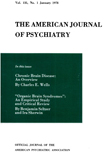Coping styles of 34 adolescents with cerebral palsy
Abstract
The author presents a follow-up study of 34 children with cerebral palsy. Eight years previously 23 of these children were attending a special school for handicapped children, and 11 were attending regular schools. The author evaluated the children and their families through formal and informal interviews and by administering parent and teacher rating scales of the children's behavior. He found that the development of these children between the ages of 10 and 14 was highlighted by their increased awareness and their parents' awareness of the permanence of their handicap and their consequent search for personal and, ultimately, occupational identity and their parents' emotional withdrawal.
Access content
To read the fulltext, please use one of the options below to sign in or purchase access.- Personal login
- Institutional Login
- Sign in via OpenAthens
- Register for access
-
Please login/register if you wish to pair your device and check access availability.
Not a subscriber?
PsychiatryOnline subscription options offer access to the DSM-5 library, books, journals, CME, and patient resources. This all-in-one virtual library provides psychiatrists and mental health professionals with key resources for diagnosis, treatment, research, and professional development.
Need more help? PsychiatryOnline Customer Service may be reached by emailing [email protected] or by calling 800-368-5777 (in the U.S.) or 703-907-7322 (outside the U.S.).



